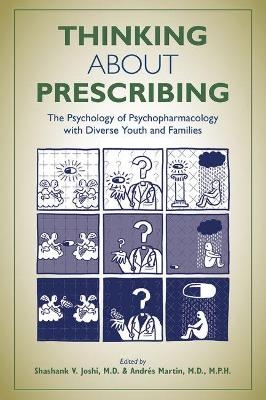
Thinking About Prescribing
American Psychiatric Association Publishing (Verlag)
978-1-61537-388-8 (ISBN)
Our remedies are only as good as the way in which we dispense them
That's the central premise of Thinking About Prescribing, a new volume that encourages pharmacotherapists to view the prescribing of a psychiatric medication to young patients not simply as part of a clinical visit, but rather as the beginning of an ongoing alliance with youth and their parents or legal guardians.
The book makes the case for a partnership that doesn't lean on psychiatric jargon or an encyclopedic list of side effects, but instead on measured candor, vulnerability, and—most importantly—time.
Thinking About Prescribing leverages the knowledge of more than two dozen experts as it tackles topics that include:
• The essential features of the Common Factors approach and the Y-model of psychotherapy, which highlights how relational aspects of pharmacotherapy are key to child & adolescent psychiatric practice, even for brief visits
• How best to utilize the 30-minute Brief Pharmacotherapy Visit (BPV), so that the alliance is nurtured and time is most efficiently utilized
• Techniques, adapted from evidence-based psychotherapies, to enhance medication adherence in diverse youth populations
• Approaches to adapt psychoeducation for culturally diverse populations, and consider why many youth & families may be skeptical of pharmacotherapeutic interventions
• Strategies to cultivate a pharmacotherapeutic alliance when engaging with patients and families via telehealth, including in the school setting
• Tips for pediatricians, advanced-practice clinicians, and other primary care providers who conduct pharmacotherapy
The chapters feature key takeaways that distill the most salient points and that aid in knowledge retention.
Rather than raise unrealistic expectations (two chapters acknowledge the reality of practicing when time and resources are scarce), the goal of this book is to help pharmacotherapists mitigate the stigma, apprehension, or resignation their patients may have and instead build and maintain a trusting relationship that will be key to successful therapeutic outcomes.
Shashank V. Joshi, M.D., is Professor of Psychiatry, Pediatrics, and Education at the Stanford University School of Medicine and Graduate School of Education, Director of School Mental Health at Lucile Packard Children's Hospital, and a Faculty Advisor at the Center for Comparative Studies in Race and Ethnicity (CCSRE), in Stanford, California. Andrés Martin, M.D., M.P.H., is the Riva Ariella Ritvo Professor, Child Study Center, Yale School of Medicine, in New Haven, Connecticut. He is Medical Director of the Children's Psychiatric Inpatient Service at Yale New Haven Health, in New Haven, Connecticut.
Uncovered
Prescriber, Prescribe Thyself (By Way of Introduction)
Chapter 1: Think Again About Prescribing: The Psychology of Psychopharmacology
Chapter 2: The Many Facets of Alliance: The Y-Model, Applied to Child, Adolescent, and Young Adult Psychopharmacotherapy
Chapter 3: Psychodynamics of Medication Use in Youth with Serious Mental Illness
Chapter 4: "What's in It for Me?": Adapting Evidence-Based Motivational Interviewing and Therapy Techniques to Adolescent Psychiatry
Chapter 5: Providing Psychoeducation in Pharmacotherapy
Chapter 6: #KeepItReal: The Myth of the "Med Check" and the Realities of the Time-Limited Pharmacotherapy Visit
Chapter 7: Pharmacotherapy or Psychopharmacotherapy: When Therapist and Pharmacologist Are Different People, or the Same Person
Chapter 8: The Pharmacotherapeutic Role of the Pediatrician, Advanced Practice Clinician, and Other Primary Care Providers
Chapter 9: The Pharmacotherapeutic Alliance in School Mental Health
Chapter 10: When Time Is Tight and Stakes Are High: Pharmacotherapy, Alliances, and the Inpatient Unit
Chapter 11: Telepsychiatry Goes Viral: Psychotherapeutic Aspects of Prescribing Via Telemedicine Amid COVID-19
Chapter 12: Alliance Issues to Consider in Pharmacotherapy with Transition-Age Youth
Chapter 13: The Pharmacotherapeutic Alliance When Working with Diverse Youth and Families
Chapter 14: The Psychopharmacotherapeutic Alliance When Resources Are Limited
Chapter 15: Building a Therapeutic Alliance in Psychopharmacology During Clinical Trials: Ethical and Practical Considerations
Chapter 16: The Power of Placebo
Chapter 17: The "Good Enough" Pediatric Psychopharmacotherapist: Practical Pointers in Six Parables
Chapter 18: Teaching and Mentoring the Next Generation of Pediatric Psychopharmacotherapists
Gratitude
| Erscheinungsdatum | 06.08.2021 |
|---|---|
| Zusatzinfo | 13 Figures; 21 Tables, unspecified |
| Verlagsort | VA |
| Sprache | englisch |
| Maße | 152 x 229 mm |
| Gewicht | 630 g |
| Themenwelt | Medizin / Pharmazie ► Medizinische Fachgebiete ► Psychiatrie / Psychotherapie |
| ISBN-10 | 1-61537-388-8 / 1615373888 |
| ISBN-13 | 978-1-61537-388-8 / 9781615373888 |
| Zustand | Neuware |
| Haben Sie eine Frage zum Produkt? |
aus dem Bereich


